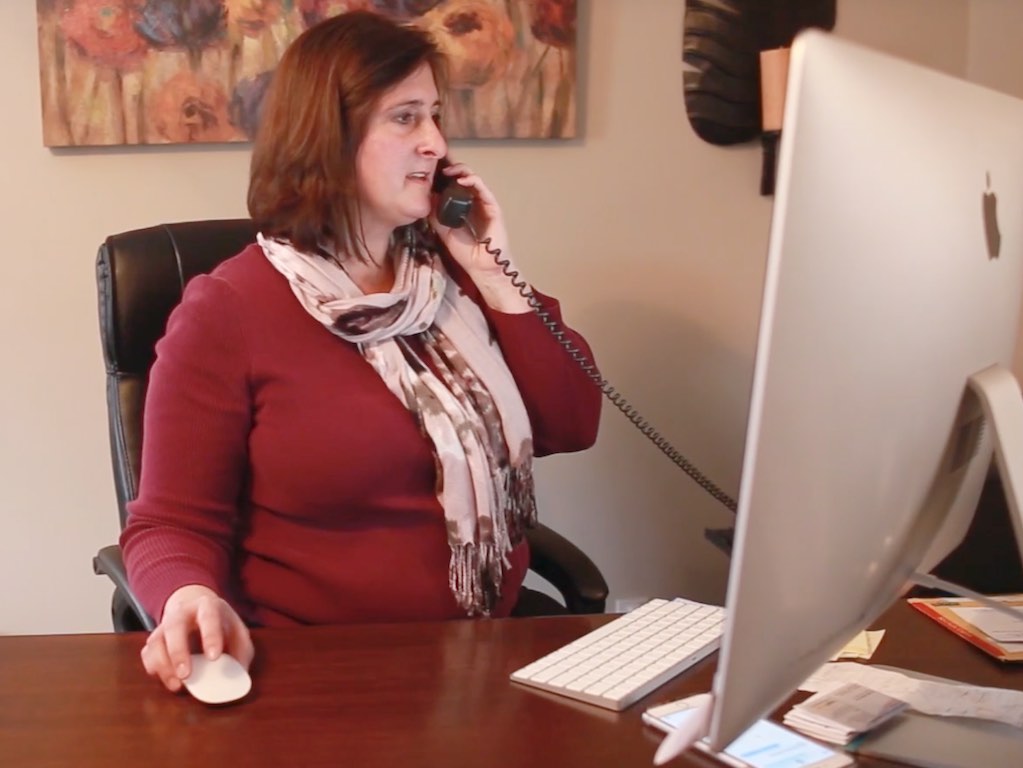Good credit and the right qualifications are just the first part of starting a home care franchise
Starting a home care franchise is a wise investment, especially considering the aging population. That’s one of the reasons you found your way to the Touching Hearts at Home website. However, how do you finance a home care franchise? Starting a business does take money, after all, and it’s a full-time commitment.
Don’t panic, because you’re not alone. Every year, thousands of entrepreneurs start businesses utilizing every conceivable financing option. In fact, financing a home care franchise is one of the most common ways entrepreneurs secure the capital to open their home care business.
The options to finance a home care franchise like Touching Hearts at Home are vast, and they can be overwhelming. But here is everything you need to know about the most common options when it comes to financing a home care business.

How much up-front money do you need?
Before you start looking for change in the couch, you first need to determine how much it’s going to cost you to finance a home care franchise. On this front, there’s good news and bad news.
First, the good news: every franchise opportunity provides detailed breakdowns of the costs of establishing a new business with their franchise system. That includes everything from the franchise fee to the cost of business cards. In most franchise concepts, those costs also include a ballpark figure of how much you’ll need to pay your bills during the startup process.
The “bad news” isn’t so bad, really. You have to be able to pay your bills during the startup process, or what franchise companies call “on boarding.” This is the period of time between your initial inquiry and the day you start generating revenue with your new company. There is a silver lining, however.
Many of the financing options discussed below will include the money for payroll—meaning you can pay yourself and your staff while you’re getting up and running. Also, never underestimate the power of a good budget to get you through the initial crunch.
To sum, it’s important that you establish a realistic budget of how much you’ll need to cover both the franchise costs and your living expenses while you’re starting a home care business. For Touching Hearts at Home, the initial investment ranges between $52,900 and $75,600 before living expenses.
Here are a few places you can find those funds.
Borrow against retirement funds without taxes or penalties
If you’ve been in the workforce a while, you most likely have a 401(k) or Individual Retirement Account (IRA). Typically people build up their 401(k) and IRA accounts to save for retirement. However, many people don’t realize they can also use those funds as loan collateral. Best of all, the process for using these funds is pretty simple.
In fact, during the Great Recession, tapping into retirement funds became a very popular way to finance a new home care business. The advantages are pretty straight forward: there is little-to-no interest cost associated with the funds, and so long as they are repaid, you pay no penalties. Also, it’s your money. You don’t have to go through a lengthy qualification process to get access to it. This means it’s also one of the fastest ways to finance a home care franchise like Touching Hearts at Home.
Repayment is flexible, too. As your business grows, you make payments into your account. However, it’s not without risks. Your business becomes your retirement plan. If you aren’t confident you can beat the rate of return you’d get in the stock market, other financing options might be best.
SBA loans
The U.S. Small Business Association, or SBA, has long been a mainstay of business financing. Chances are you heard a little bit about the SBA during the pandemic, particularly their Paycheck Protection Program (PPP). What you may not know is they are one of the go-to sources for new, small business startups.
SBA loans are government-backed and low-interest loans. These loans are obtained through a traditional bank or business financing company, but because they are guaranteed by the federal government, they can be much easier to obtain. These loans come with incredibly low risk for banks, and they’re almost always looking for new entrepreneurs to write new loans to.
The advantages of an SBA loan are clear-cut. You finance a percentage of the cost of your business, which allows you to conserve valuable cash reserves. At the same time, SBA loans feature low interest rates and no prepayment penalty. That means you can refinance them for better terms without losing the equity you’ve built up.
There are a few things you should know about SBA loans, however. They aren’t the fastest loans to obtain, and it can take three months or longer for the money to come in. The loans also require 100% collateral—meaning if you borrow $100,000, you have to give up $100,000 in value to secure the loan. If you’re a potential entrepreneur who has invested most of your income into your home, you might want to consider a home equity loan instead.

Home equity loans
For individuals who own a home and have owned one for many years, chances are you have built up a significant amount of equity in your home –the portion of your home that you own “outright” versus what you still owe the bank. For these entrepreneurs, a home equity loan is a great option to finance a home care franchise. In fact, many Touching Hearts at Home franchise owners have done just that.
Before you go rushing down to the bank, though, take just a moment to determine which kind of home equity loan is right for you. There are two common home equity loans available:
Home Equity Line of Credit (HELOC): A HELOC utilizes the equity you’ve built up—the amount you’ve paid over what you owe. If your home is worth $300,000 and you only owe $50,000, you have built $250,000 in equity. One of the great advantages of a HELOC is flexibility. HELOCs will allow you to borrow only what you need while protecting your equity up to that level. So if you get approved for a $100,000 HELOC loan, but you only end up using $80,000, your total loan amount is $80,000. However, this means your monthly repayment amount may change, depending on how much you’ve used. So if you’re someone who needs a “fixed payment” every month to manage your budget, consider other options.
Home Equity Installment Loan (HEIL): A HEIL loan is a fixed amount you borrow from the bank and repay on a fixed repayment schedule. These loans are also known as a “Second Mortgage,” because you borrow $100,000 and repay that amount each month, regardless of how much of that money you ended up spending on financing your Touching Hearts at Home franchise.
Regardless of which of these two options you pursue, if you’re using your home’s equity, you’ll also have one additional challenge. Your bank will require you to show enough income each month to repay the loan—from existing income sources. You won’t get to use projected earnings from your new home care franchise to qualify for the loan. Your bank also may require a costly real estate appraisal, so just be prepared.
Bank Loans
If you’re one of the savvy entrepreneurs with a near-perfect credit score and plenty of credit availability, you may qualify for a bank loan simply based on your credit worthiness. Often referred to as a “signature loan,” these loans don’t typically require collateral and they also come in line-of-credit and fixed-rate borrowing.
The bank determines your creditworthiness based on a variety of factors, many of which go beyond just your credit score. So if you’re considering a bank loan, it’s important you choose a bank that knows you and your loan history.
Bank loans are a great way to finance a business and they can be helpful in a cash flow shortage, as well. However, getting bank loans can be notoriously difficult, because their main goal is to make sure they’re going to get their money back. Ultimately, it’s the bank that will provide you with the money, and usually, they want to see a company and an owner with a proven track record of success.
Pro Tip: If you’re considering a bank loan, you might also explore joining a credit union. Credit unions are nonprofit organizations and do not pay state and federal taxes. That means they can usually offer much more competitive rates, and they often will be a little more flexible with lending. However, not all credit unions offer business services. So before you head to the branch, do your homework.
The Friends and Family plan
For some entrepreneurs, the avenue they choose to follow is a time-honored trail to ownership. They ask friends and family to invest in their success.
While this plan is not ideal for every individual, for some it makes the most sense. That’s because your friends and family know you. They can depend on you to follow through on your commitments. They also may not require you to provide collateral.
However, you should consider what happens if your business doesn’t meet your expectations. Failing to repay a loan from a friend or family member in a timely fashion can put strain on relationships. They also may want favors you aren’t able or willing to grant. And in some cases, they may feel like they are a “partner” in your new venture, even when they aren’t.
If you are considering a friends and family loan to finance your new home care business, proceed with caution and make sure you set clear boundaries and expectations before you cash the check.
Ready to join Touching Hearts at Home?
If you’re ready to start your home care franchise with Touching Hearts at Home, reach out to one of our franchise sales team members today. You can also download our Franchise Information Guide for more information about the costs and benefits of joining the Touching Hearts at Home family.





